In Order To Believe - A Teru Mikami Analysis
Teru Mikami is definitely in my Top 5 of ‘Characters The Fandom Gets So Wrong For Reasons Beyond My Imagination’ and I think this calls for a lengthy explanation of his character. Because I like talking about him.
In Mikami’s case, what a large part of the fandom seems to have taken away from this character is 'psycho light stalker lol’ and I don’t know where to start with how wrong that is other than by starting right from the beginning.
Grab a drink and some snacks, we’re now going through all of his appearances in manga and anime chronologically, and explaining a little more about what those tell us about his thought process.
This is all, analysis, interpretation and manga/anime comparison. If there is anything you feel I got wrong or warrants further discussion, I’d be delighted to talk it through with you.
There are content warnings for bullying and suicide and generally everything else that could apply to Death Note. Also obviously spoilers, but I assume anybody who reads this has finished the show either way.
(This post is both wordy and image heavy, so be warned. We’re talking roughly 13000 words and roughly 80 images here.)
UPDATE SEPTEMBER 2015: Boy, this thing is outdated. Since writing it a year back, a lot of my opinions changed subtly and I have been able to read into things to a much greater depth, so please take this with a grain of salt.
A lot of it is still applicable, but I feel I need to put a disclaimer that I (now less than ever) consider it a be-all-end-all of Mikami analysis. It can certainly be a starting point for own thoughts, but please don’t read uncritically. Thanks!
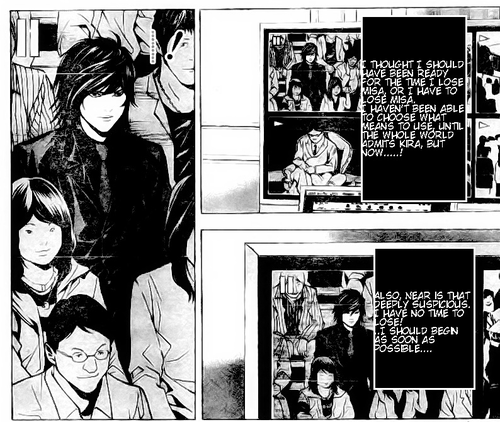
We get introduced to Mikami when Light spots him in a Sakura TV broadcast as he’s on the search for a new Kira who could substitute for Misa. (He does this in broad daylight with his task force around - investigation, Light, sure.)
Mikami’s there, in the audience of one of the pro-Kira shows and he catches Light’s attention. I would like to think Light was just like 'hot damn’, but that would be an interpretation completely against all reason.
Rather, Light seems to choose Mikami based on his lack of visual enthusiasm. While the other people in the audience are cheering like crazy, going wild, irrational and annoying, Mikami just observes. He doesn’t wear merch or carry banners - he’s there in his suit, professional and calm. Not only in one broadcast, but in at least two different ones.
Light learns the same things about him then that we as the readers do: Mikami is level-headed but against outer appearances devoted to things relating to Kira. After all, there is no other reason for him to be in the audience again and again.
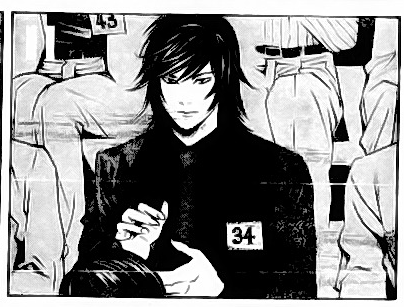
The face of a man very pleased with Demegawa’s entertainment. Not.
Now, Light is interested enough to check the questionnaire for audience that Mikami had to fill in to get into this broadcast and he likes what he sees.
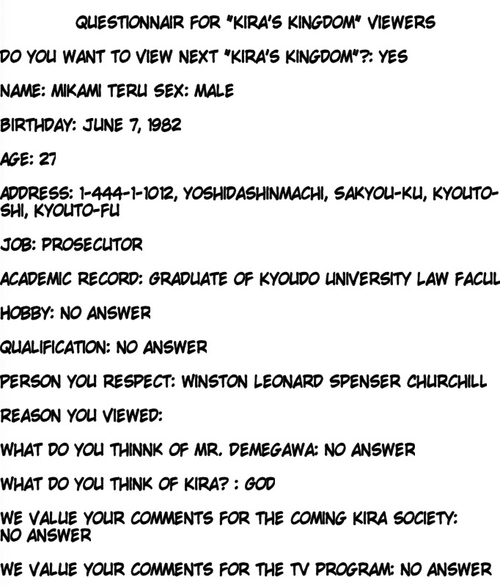
Most of the questionnaire is blank. With how much Mikami likes rules, you’d think he’d be very thorough about every question on questionnaires as well, but evidently he isn’t. Rather he seems to operate on a 'what’s necessary’ basis and disregards everything that’s deemed meaningless.
What he fills in are mostly the necessities, details about his person. He leaves mostly everything regarding Kira’s Kingdom itself blank which is probably the politest thing he can do without lying. The show is terrible and Mikami knows it. He only states he is going to watch the next broadcast - again, as someone invested in Kira matters he can’t let this popular show go unchecked.
What I think is interesting is how he does fill out the question asking for an idol / a person he respects.
Winston Leonard Spencer Churchill.
Never in my life have I heard anybody other than Mikami say the full name instead of just 'Winston Churchill’ - who even does that expect for someone obsessed with details and accuracy?
Back to the point, Churchill is apparently relevant enough for Mikami to mention him here. I am sure this is something that warrants an entire analysis of its own but that is not one I am qualified to write. I know a lot about Mikami but I know a lot less about Churchill.
(I just find it moderately interesting that a lot of people (including my own mum) have compared the Kira society to dictatorship akin to WWII. For Churchill to be his idol, Mikami must have studied his life a lot and thus WWII - and naturally despised all that Germany stood for in it. Despite that, he winds up a loyal follower of another totalitarian terror reign.)
And then there’s the most important point
'What do you think of Kira? God.’ Straight to the point and honest. However, since most of this post is going to be about his Kira-thoughts anyway, let’s save that for later.
Next time we see Mikami he receives Kira’s letter in his house. He lives in a large apartment in a large apartment building. Judging by the fact that he has an ashtray at home despite not smoking and being unlikely to allow others to smoke inside (or have any guests at all), the apartment was probably already furnished when he moved in.
EDIT: An alternate theory for the ashtray that I have been presented with is that ashtrays can also be owned just to put matches in after lighting candles with them, or something similar. They do not necessarily indicate smoking and may very well be in the posession of someone who does not smoke.
His bookshelves cover the entire wall and they’re full of books about law. There is one, however, that is about post-war history, suggesting that aside from law he also studies history and politics more closely. He is very very interested in society as a concept after all.
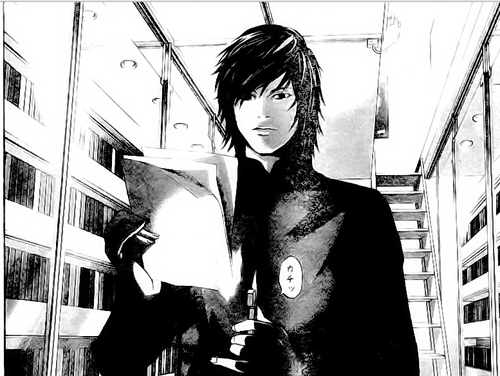
The fact that all his tons of books are the exact same size is probably just something done to make drawing the background easier, but it really does drive the point home that he is order-loving to the point of being obsessive about it.
Also his apartment has two stories and the stairway looks more like a ladder - this always sticks out to me for no particular reason.
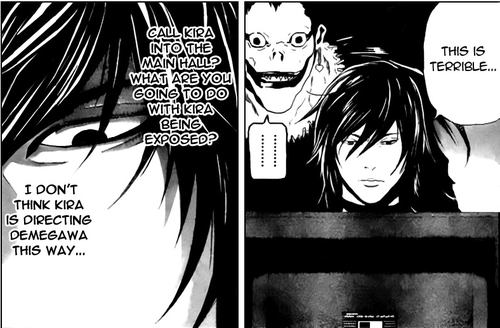
Soon we’re back to Mikami watching Kira’s Kingdom - in the privacy of his home, easily stating his real opinion. (He watches it on his computer despite his wall later being shown to have TV screens in it.
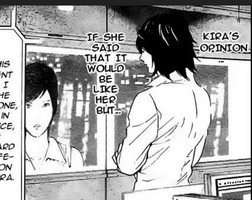
Why.)
Now we start to get real glimpses at his mindset. Having become Kira’s henchman, he doesn’t sit idly and wait for orders by his God. Rather, he immediately starts thinking for himself, assuming about Kira’s thoughts and situation.
There are two things particularly interesting about this.
1) Mikami’s self-confidence
His worship of Kira has been made clear already, but despite that, Mikami does not think Kira above all human judgement. He very naturally assumes himself able to follow Kira’s thought process and act rightfully. While he does think things over very, very carefully, he’s not overly doubtful of his own actions.
Mikami thinks he is righteous and that his righteousness is absolute. Since Kira is also righteous, the God of righteousness, obviously their thoughts have to align. That seems to be his mindset.
2) A God is made by actions not supernatural qualities
At this point, Mikami already assumes Kira to be in a position where he cannot act. This should prove that Kira is not an omnipotent real God, but Mikami is uncaring of it. His religious worship seems to be earned primarily by righteousness of action and only secondarily by supernatural power.
The knowledge that Kira is not an actual God does not stop Mikami from considering him so. At this point he has met Ryuk and Ryuk has told him once that he is not his God, so Mikami has the existence of real gods, well death gods, confirmed. Still, he chooses to place all his belief in the one he know can reasonably assume to be fully human.
Furthermore, through this thought process, Mikami keeps his eyes closed and his hand gingerly placed on the Death Note - soft mannerism of worship.
And then he makes up his mind and - oh boy.
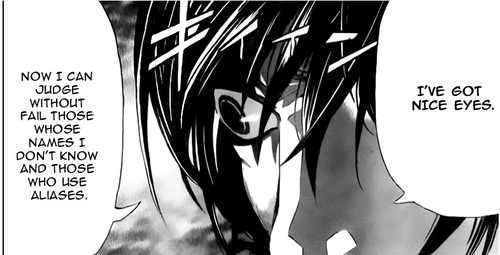
Well, that eye deal didn’t take long. We’re never shown any mental struggle about it and honestly, we can assume there was next to none. His own life is worth nothing in comparison to the greater good. From childhood on Teru has shown himself to be physically self-sacrificing - giving up half his life for justice is nothing to him.
So he starts killing off Demegawa and the others on TV. And this is where we get to see how ruthless Mikami can be. He didn’t need to do this on TV, for all the world to see and be traumatized by it. He could have been discreet and more respectful to the people in the audience, but he wasn’t.
Because this is a statement, this is a demonstration of power. Kira is absolute and Demegawa tried to use his fame for himself. Mikami won’t allow this to pass. For this crime, Demegawa deserves the humiliation. The entire world needs to see now, in full color, how wrong Demegawa’s actions were
We’re also introduced to the infamous repeating of 'Eliminate’ whenever Mikami writes a name. It’s like a mantra and like he needs to hear out loud when he makes a difference and there is one less evil person in the world, so he can truly believe it
Before we go to his backstory chapter, let’s go through the scenes we just spoke about in anime version to see if there is anything significantly changed or added.
The anime jumps in at the Demegawa death scene and let’s just say they made it more visually impressive but also more nonsensical.
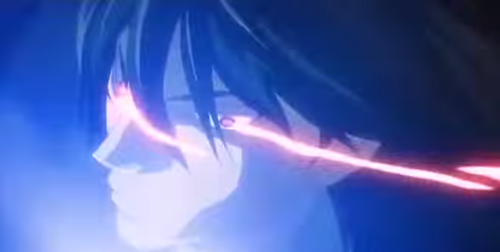
Mikami literally shoots laser beams from his eyes.
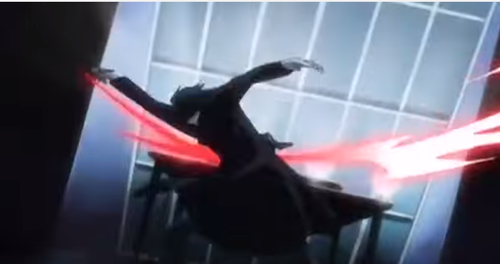
Somehow, his desk chair is gone here. Somehow he is still wearing his coat for outside despite being inside at a desk. Somehow he is writing in ways other people would consider acrobatics.
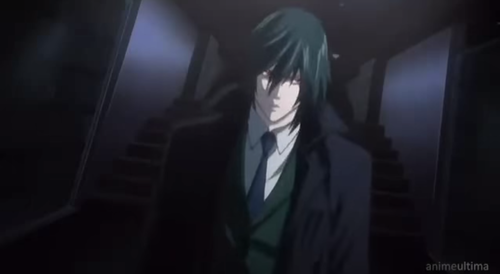
There is also the question of where he even is. This generally looks like his home in the manga, but it has this huge-ass stairway added that makes this seem like the exact opposite of a private apartment.
It certainly makes this look very intimidating and like him and Demegawa were in the same scene… but the logic kind of went down the drain.
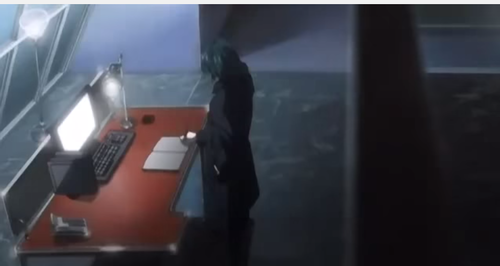
And then there is a hallway seemingly going from right of his desk to… somewhere. It’s supposed to be another room of his home, I guess, but this entire scene makes it look like his desk is just conveniently placed in the middle of a giant hallway in a giant government building. This looks nothing like the private home it is supposed to be. And seriously, where is the chair?!
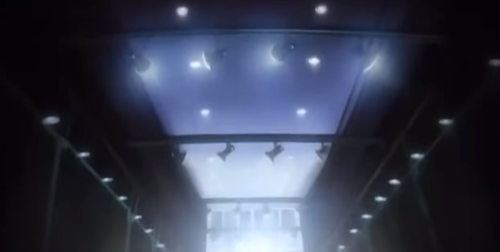
The roof, just for further reference on this strange room supposedly located in Mikami’s apartment.
I know this is supposed to be an analysis and we’ll get back to that in a moment, but at this point all I can say is really 'wtf art directors’. If anybody can make in-universe sense of these design choices, please tell me, because I can not.
Something the anime makes very clear though is that Light has not only seen Mikami stand in the audience on TV but also heard him speak. In Light’s memories, we are shown a shot of Mikami holding a microphone and talking on TV. Here it is clear, he didn’t choose him entirely based on attitude and questionnaire but also based on his actual words.
We’re also shown his handwriting on the questionnaire, not pretty but easily readable, the writing of a person who writes a lot.
Now, back to the manga for a bit. Here we are, the most relevant point next to the finale - his backstory chapter 'Accident’.
Teru was a child who could tell good from bad far better than an average person and a child who had seen more death than an average person.
From earliest childhood on Teru liked living a 'correct’ life. He liked being class representative, getting good grades and he aimed for those around him to also live 'correctly’. Any form of success that you could measure by societal norms was good to him. Black on white, this kind of correctness was a definite guideline to see how well you did. It was something easy and real to take pride in.
What sets Mikami aside in this, is how he does not only apply his guideline to himself but also to those around him. Not only was he aiming for his class to become best of Japan, he also could not tolerate the misbehaviour of those around him.
It wasn’t enough for him to live by the book - if someone else went against the book and he let it happen, Mikami knew he’d be guilty just as well. At no point in his life, Mikami could be a bystander.
So when bullying happened in his school, Mikami would jump in to help the victims. Where others first think of protecting themselves and not getting hurt, Mikami spared no thought for his own well-being. He wouldn’t be well if he turned a blind eye, so what was a bruise or two when he could help and stay morally clean and pure.
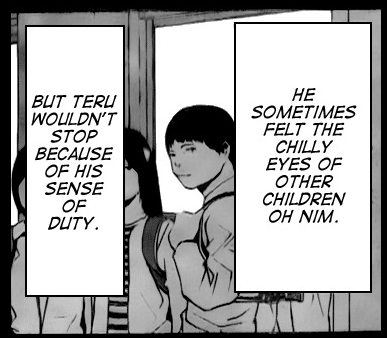
Other kids took him for a fool to do so and Mikami realized that. Even this early on, he began to feel he and his values were different from the people around him. He was becoming isolated.
But why all this…?
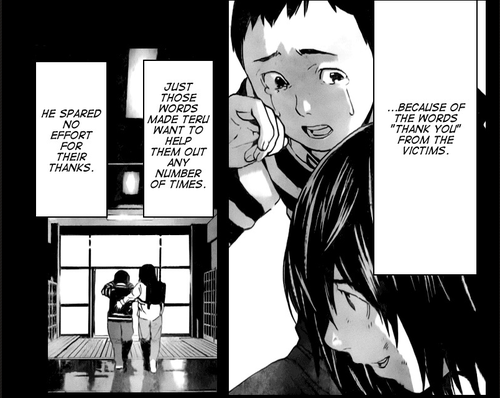
Essentially, for self-validation. The feeling of being needed, of someone appreciating what he did. 'Tell me I’ve done good, tell me I’m a good person.’
This is of course a mean way to read into the good acts of a child who gives up his own security for the sake of others, but it fits into Mikami’s over-all personality.
However, this also shows how the younger Mikami was much less tainted than his older self. Someone’s 'thank you’ meant something to him. The real words of another human being, uncertain as they are, are very different from being validated by something like a grade on paper. Back then, Mikami could value and accept someone else’s feelings.
With elementary school students he was successful - eventually, people came over to his side, impressed by his strong will. In elementary school justice could win
But in middle school, with his fellow students becoming more tainted by life as well, justice couldn’t win.
Up until then, whenever Mikami got hurt, he got hurt in the attempt to protect someone. He was never the one first attacked. This changed in middle school - Mikami joined the ranks of the bullying victims.
For the other victims, there had always been someone on their side - that person was Mikami. For Mikami, there was no such saviour. He was on his own to endure what he was put through. All the people previously on his side were pressured into joining the ranks of bullies and spectators.
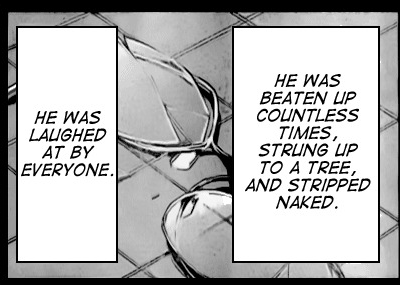
He was put through hell, humiliated in every way possible. The shot of his broken glasses gets me particularly, considering this likely happened more than once and new glasses are expensive. His single mother likely didn’t earn that much money either.
Looking back at how he was dressed in elementary school this is further supported. He wears something akin to a uniform, despite the fact that his elementary doesn’t have one. Correct and overdressed all the way since childhood. His pants are too big for him, rolled up - possibly so he can grow into them. This is just speculation of course, but unfitting clothes are often -though of course not always - seen on children of those who can’t afford too much.
Back on topic, Mikami grew bitter and hateful towards his abusers. I think this is something everyone who has ever experienced bullying can relate to. You suffer and you think it’d be better if the people tormenting you disappeared. After all, if they only bring pain then what use is their existence?
Mikami perfected this thought process. By thinking that those attacking him had no justification for their existence while he did have one, he was able to keep going.
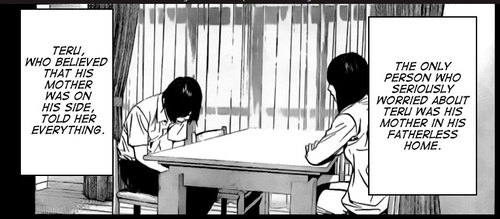
And this guides us to the possibly most misunderstood part of his character: his relationship to his mother.
At this point, his mother is his only support network. He doesn’t have friends, he doesn’t even have allies, he doesn’t have any other family members stated to be close to him… There is only his mother to rely on.
His mother is here stated to be the literal only person to worry, which makes it safe to say no teachers ever took interest in his bullying case either.
So, his mother being the only one he thinks he can rely on, he confides in her.
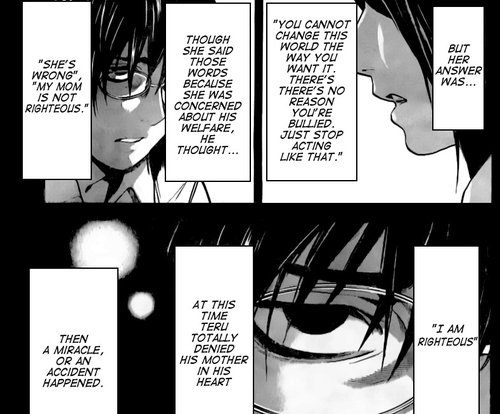
And this is the result. People always act like this came easily to Mikami and meant nothing to him to do. Like he just closed his mother off like that, no big deal, nothing lost.
In truth, this is probably the second most painful event in his life. Out of all people in this world, there was one he thought he could trust and when he, for the first time, tries to test that trust he has to realize that person doesn’t understand him at all.
Ms. Mikami shows zero sympathy for Mikami’s noble goals. Rather, her statement boils down to 'that you are bullied is your own fault for being this way’.
Mikami is the one being regularly beaten up, but she primarily blames his actions for it rather than the people who actually hurt her son.
Naturally, she is looking for an easy way to protect him, but by doing so she disrespects his feelings.
If Teru considered the words of his mother to be true, he’d have to acknowledge that he had suffered for nothing in the past years. 'You can’t change the world to the way you want it to be’. You have no power whatsoever and whatever ideals you were following were an illusion. There was no point to your self-sacrifice.
That’s what he hears and that’s what he cannot accept.
Furthermore, Mikami is not just acting 'like that’ because of a whim - it is a moral guideline. He thinks hurting people is not acceptable so he stands up against it - however, his mother, by telling him to just stop, accepts a world in which suffering is normal. His mother accepts the evil in the world as a natural part of it and does not consider fighting it a priority.
Had his mother been one of many people to support him, who knows if he would have reacted this heavily to her 'presumed’ betrayal. But the higher the expectations the more grave is the disappointment. Mikami had placed all his faith in her and he had it disappointed and it hurt him more than anything. That was why he felt unable to let her in again.
And then - before he gets a sufficient amount of time to maybe fix his relation to her! - she dies. Alongside four of the people Teru was bullied by - by their hands.
And here is the turning point in Mikami’s life. Up until now, he only had the vague wish that people he hated should disappear. It was a concept, nothing concrete. Now he is directly faced with their disappearance. Their death.
And his mother among them.
People always tend to think it was easy for him to accept his mother’s death as a 'good thing’ but I do not think this was the case at all.
Mikami, who already had next to nothing, lost the last thing he had - first emotionally and then entirely. Mikami, who needs order above all, has in one chaotic moment seen all he knew fall apart.
Remember, his mother was the only one worried about him - now after her death, he is left on his own to cope with it.
He was terrified and he wept, as is stated in canon.
And here’s the thing: Mikami likes to believe in a world order that is certain and stable, that he can rely on. Accepting his mother’s death as an accident, as something that just happened without reason, would mean accepting that there is no such thing. He would not only lose his external support network but also whatever internal stability he had left.
He can’t do that. So rather, he figures there must be a reason she died alongside those horrible bullies. So he starts by figuring out why they died.
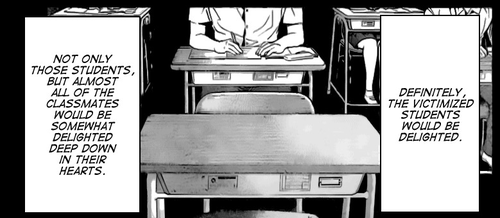
They obviously died for the good of everyone else. Mikami notices how nobody in class seems to miss them - how their loss seemingly has brought nothing but more happiness in the long run.
And he wonders what his mother had in common with them. It’s surprisingly easy: she also did not stand for justice.
So even if her offense was not nearly as grave, that had to be what connected her to the others, the reason she had to die.
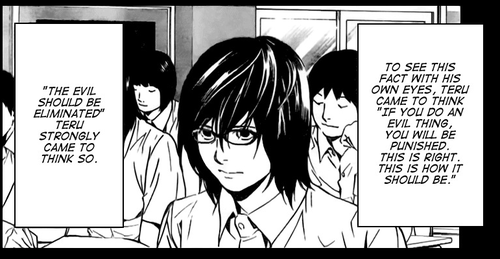
People seem to often think his extremist mindset was already there prior to his mother’s death and therefore the reason for his reaction, but that is switching out cause and effect.
Rather, his extremist views are born as a way of coping with the loss of his parent.
Of course, the basic mindset had already been there, but this is what puts the last nail in the coffin.
He directly gets to see the effect of an 'elimination’ and he considers it good. This is where his God is born. At this point he is in middle school, so maybe 15. Light, who is 4 years younger than him, is around 11 at this point if not younger.
By the time Mikami’s vague belief in heavenly justice comes together as a firm belief in a concrete God, Light is far from being Kira. Kira is not Mikami’s God.
Mikami’s God is imaginary, created to help him cope with the loss of his single guardian.
In a weird-ass way God is the substitute for his mother, as well as the ultimate representation of order and purpose. As long as Mikami believes, his life is not pointless and he can keep going.
Seeing Mikami is an orphan at this point, I would like to provide information on where he lived the rest of his teenage life… but there is none. My only guess is that a distant relative with whom he never shared any close bond took him in.
Mikami didn’t change his behaviour at all, he just focused more on his studies and excelled. He is an intelligent person after all.
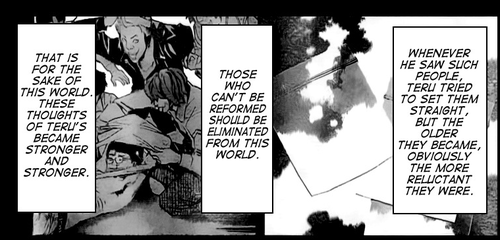
And look and see, Mikami’s believes are still a work in progress. Unlike general fanon interpretation he didn’t wake up one day to be like 'I now am a heartless Kira fanatic’. Rather, his fanatic nature is shown to develop gradually over his entire childhood and teenage life.
The line shown here as 'the older they got the more reluctant they were to change’ has been translated in other versions as 'the older Mikami got the harder it became to change people’ and I think both fit his life experience.
For one, the anime shows this at least, he still considers children able to change while he doesn’t think this way about older people. On the other hand, this naturally matches with his life experience of changing those around him - the older he got, the less people he found he could influence for the better. And with this his believe that people could change at all subsided.
He came to believe in a point of no return at which a person’s sins are irredeemable and can only be punished by death.
And he finds validation. People he can’t accept do die. Nine people by the time he’s in college. By coincidence, there is a lot of death around him, and since Teru is so strict with whom he accepts and does not accept most people at this point… death very easily comes to those he deems unrighteous. Just statistically, because there are more of them than there are righteous people.
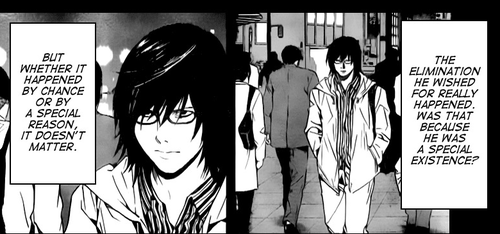
And for a while Mikami is like one of those people at the start of Death Note who think they could be Kira without being aware of it. He wonders if it’s somehow his doing that these people die - which is a fucked up thing to wonder in his situation, considering it means he also wonders whether or not he subconsciously killed his own mother.
But in the end it doesn’t matter if it’s because of him or not - what counts to him is that it happens. There is a divine punishment waiting. There is justice out there, Mikami thinks.
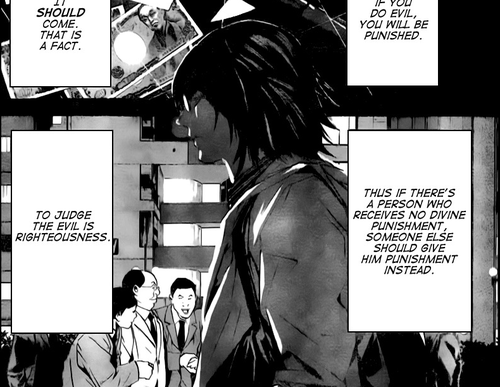
Now, making his life decision to become a prosecutor who can punish evil on earth, Mikami is visually paralleled to Light as he thinks the world would be better off without certain people at the start of the manga. Notably, this is right before he kills Takuo Shibuimaru and becomes Kira for real. Mikami’s decision to prosecute is directly paralleled to Light’s decision to become Kira.
So Mikami wants to become a prosecutor and since he is incredibly smart and dedicated he manages to do so in no time at all. By the time Kira appears on earth, Mikami just got his job. That’s autumn 2003. Mikami is only 21 years old.
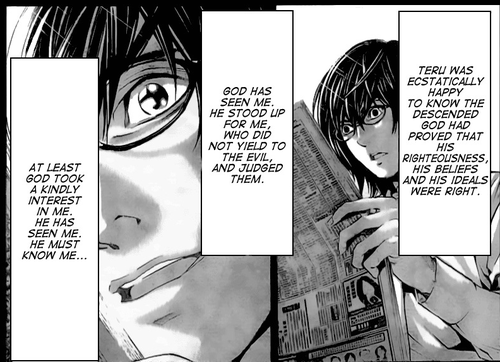
So Kira appears and, boy, does Mikami get arrogant about it. Since he is so strict, he doesn’t accept other people as righteous. He might not even know a single person who conforms to his sense of judgement. And since he doesn’t think other such people exist, he directly relates God’s appearance to his own doing.
He thinks that he, his work for justice, is the reason God saw a point in correcting the human race’s awful behaviour. In a way he is insinuating he is the one who gave God hope, not the other way around.
But on the other hand, Kira’s appearance really bring hope in Mikami’s dull life. All words that might have been still nagging at him, about his efforts being pointless, now are null and void. He has been justified. God is real - more powerful than ever and now noticed by other people.
So Mikami thinks that all his warped logic he has clung to in order to cope with his shitty life has been right. He is right. He knows the universal truth of righteousness.
And here it gets paradox. Despite the fact that Mikami thinks God is entirely aware of his existence, he tries to make God see him. This should be redundant if his confidence that God knows of him was absolute - so it likely is not.
Mikami goes to ridiculous lengths to make Kira see him be a good person - he even speaks on Sakura TV’s Kira’s Kingdom which really is trash TV that is entirely beneath him.
And he is persistent. Between his actual recognition by Light and Kira’s start appearance, six years pass.
That makes for six years in which Mikami seeks media attention for the sake of being noticed. If he started late, which is not entirely specified, it’s still a few years. Mikami becomes a public figure. A renowned prosecutor seeking to change the world in Kira’s sense. In a way he assumes an apostle position before being officially granted one.
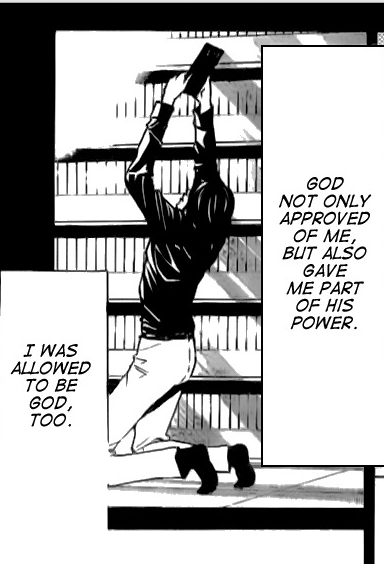
So he becomes Kira, eventually. We’re back where we started this, chronologically. It’s relevant to note that here it is said he was able to become a God as well. This is probably the most honest statement about Mikami’s believes there is - after all, what he believes in is his own construct.
Kira happened to take the spot. Mikami is so confident that his and Kira’s thoughts align, because he already made Kira up before Light could guess he’d become it. To Mikami, Kira is his 'invisible friend’, well, 'invisible God’, turned real. He has no reason to belief they wouldn’t agree.
So Mikami becomes part of the God he made up - but at the same time, he still considers himself below him. It clearly shows in his worship posture as he holds the Death Note.
The weird and twisted religious play continues. Kira is the God and Mikami is the servant.
Despite that, Mikami only lives by his own rules which coincidentally align with Kira’s.
He only uses Kira as a justification for himself. If he acknowledges that he is the one who makes the rules, his construct of supernatural rules fall apart. He has no interest in dictating the meaning of the universe per se - he just needs it to be there so he can pretend things have a purpose. He is scared of aimlessness.
So if he pretends he values Kira’s word above that of himself, he can follow the system. It’s just like getting grades - it’s a 'you’ve done well’ that can’t be disputed. Validation.
Of course, these are not thoughts he consciously realizes he has. He would fall apart, knowing his mind worked this way. His extreme worship of Kira is to prevent that from happening.
As far as Mikami is concerned, Kira is his everything and he is the devoted follower.
Easy as that.
But looking beneath the layers, Mikami might be the person to least respect Light’s authority. He doesn’t respect Light Yagami. Light Yagami is a sock puppet for his thoughts.
The moon. Teru’s own false light of morals reflects on Light, the moon. Teru sees this reflection and considers it the source of light, so he worships the moon. Ohba said something about Light’s name along the lines of 'at night you pray to the moon, thinking it’s God’ - and that’s what Mikami is doing.
More on how small his loyalty to Light Yagami the person actually is will come in later in this post.
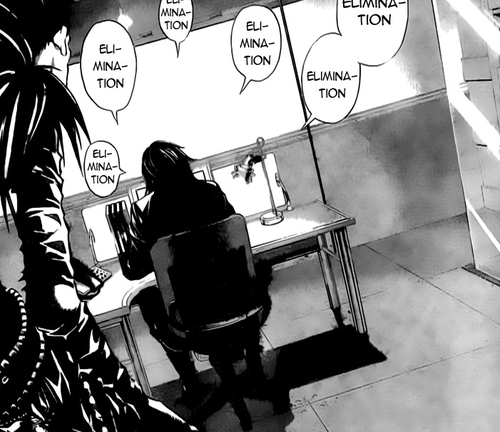
Back in the presence, we see Mikami 'pass judgement’ onto criminals. In the sweet sweet manga world where he is in a room with a chair and sits down and at least vaguely writes like a normal person.
He’s so absorbed into doing what he’s doing, he finds himself genuinely surprised that Ryuk is still with him. Mikami, someone who clings to order like nothing else and who should find it hard to accept something not strictly following logic, literally forgets the existence of a giant death god in his room. This is the amount of trance he falls into while writing names into the Death Note. No surprise his constant repetition of 'eliminate’ sounds rather hypnotizing.
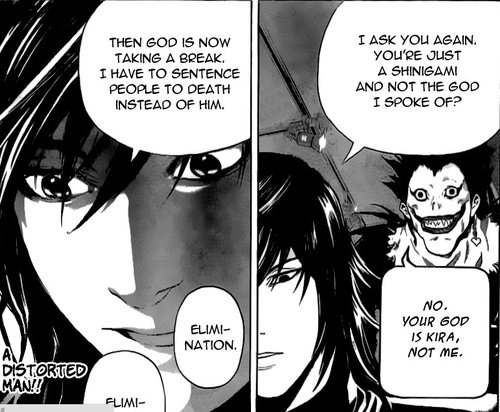
Now made aware of Ryuk’s presence, Mikami once again asks whether or not Ryuk is his God - he has considered it, logically, considering Ryuk is very much a supernatural creature. But he accepts Ryuk’s word that he’s not and gladly takes the human Kira who needs the borrowed notebook to kill over the actual god of death in front of him.
'A distorted man’, indeed.
Phew, that was a depressing backstory chapter, wasn’t it?
Well, let’s see what the anime has in store of us. Because let me tell you, they managed to make Mikami a lot more sad and sympathetic than the manga ever writes him.
To me, the main difference between manga and anime Mikami, aside from their choices in the finale, is how much sympathy for them the narrative has and expects the viewer to feel.
Of course, this is a very subjective feeling based on the effect the scenes have on me, but I hope you’ll see what I mean as we get to the new scenes the anime introduces.
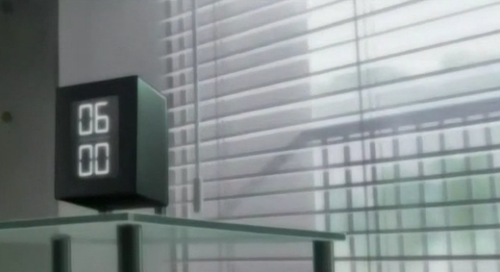
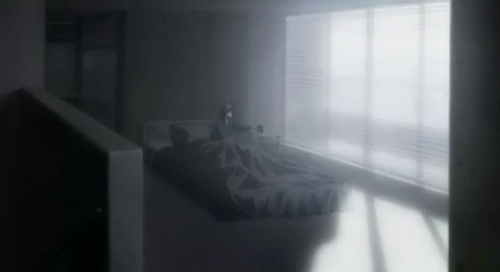
The anime doesn’t only introduce us to Mikami’s backstory but also his monotone everyday life, starting with him getting up at 6 in the morning. More of his apartment is shown here - large bedroom, large windows. Mikami seems to earn quite a bit of money.
Still, there is an overwhelming lack of … anything in the room. Aside from his large bed and alarm clock, there are no personal belongings in sight. This sterile bedroom doesn’t look like someone has lived in it for four consecutive years and yet that’s the case.
Mikami isn’t home much and rather than the homely chaos some people prefer, he likes things to be orderly and clean.
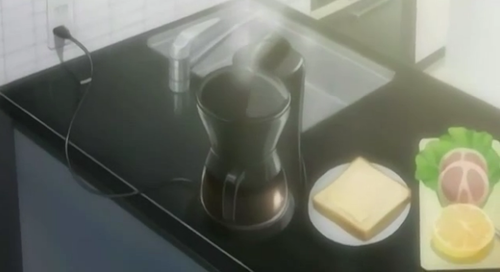
He has breakfast with coffee and a bit of fresh vegetables - it’s not much and only moderately healthy, considering the bread he eats is toast. However, it is enough to make one think Mikami does pay some attention to starting the day with energy and some vitamins. After all, he needs that to be able to work to his full ability.

His toothpaste is Dental Clinic. Knowing the brand of toothpaste he uses is about my favourite bit of Mikami trivia ever given. It’s also entirely irrelevant, I’m sorry.
About his glasses though. I can’t find any better place in this analysis to bring this up, so let’s just dedicate a paragraph to it now.
EDIT: I’m leaving this paragraph in, but I’ll add in here that I’ve been informed that Mikami’s behaviour on the train does make sense for someone who needs glasses but is not completely dependent on them as the eyesight impairment is not that severe.
Before attaining shinigami eyes Mikami is seen wearing glasses at all times. In childhood at home at his mother’s kitchen table, outside, at work, everywhere. Inside and outside. For all his life, he needed glasses.
The only exception are his appearances on Sakura TV, where for some weird reason he appears without glasses. This is even weirder considering he does wear them on his other TV appearance in Takada’s show.
My girlfriend brought up the good point that it’s Sakura TV of all things and they might very well have simply told him to take them off so he’d be more eye-candy for their viewers. We’re talking lowest rate trash TV here after all. (He’s hot with glasses though and glasses guys are in so this is not the most logical of explanations - it’s just better than none.)
So far so good - he needs glasses.
Now the thing is… the Death Note rules clearly state that by attaining shinigami eyes any human also attains perfect eyesight. At age 27, for the first time, his glasses become redundant.
However, he can hardly stop wearing them - magical eyesight healing doesn’t normally happen.
Past getting shinigami eyes he is shown to never wear them in his own home but always wear them outside. I think it is likely that, to avoid raising suspicion, he never went out to buy fake glasses and just continues wearing his real glasses, taking any resulting headaches and eye-pains in the name of his god. Keeping up the camouflage.
This is further supported by the fact that in the finale, at his big day, he appears without them. He wears them on the train to the warehouse but takes them off right before the critical time comes.
However, there is still that scene in which he pretends to Gevanni to kill someone on the train where he somehow takes off his glasses before taking a picture, texting Takada, and writing the name. If this was done because he can’t see well with his real glasses on, he’d also have to take them off at work - but he doesn’t.
So there is literally no point to him taking them off other than that it looks cool. This is the limit of my ability to explain his glasses.
To be fair, he only got glasses as a design choice because they were in when Obata designed him, explaining the unreasonable details of his eye situation - but not excusing them.
Back to the point at hand.
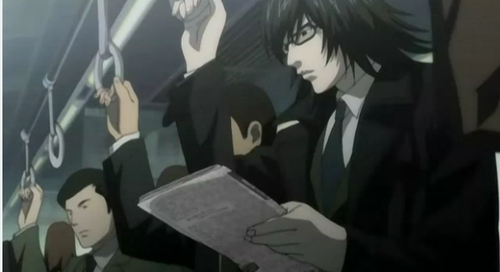
Time-efficiently Mikami reads the newspaper on the train to work, keeping up with recent happenings. (As shown in the scene where he finds out about Kira, he takes it out of his postbox on the way out.)
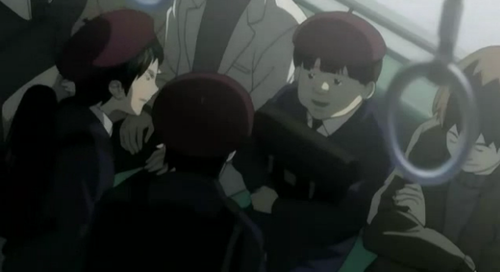
And then it starts to get interesting. There are these kids on the train - two of them assault another, who is still vaguely smiling. Like often with mild bullying, it is unclear whether the children are friends who are messing around or assaulter and assaulted.
I have experienced this a lot - people who witnessed me getting bullied somehow assumed I was friends with the bullies and thought it was just friendly banter while I felt pressured into smiling along.
So really, it is hard to tell what is happening in this situation for real, but I assume it is a real incident of mild bullying.
Mikami notices this and for a while seems to think about how to act, possibly considering the severity of offense in similar manner as I just did.
And before going over he does the first relevant thing to do: he launches into a flashback of his life.
I find it incredibly interesting that Mikami’s flashbacks that were mostly narrated in third person in the manga, are mostly spoken from his perspective in the anime. Further, they are mixed into the sequences from his everyday life.
This makes it seem like looking back at his traumatic past is part of Mikami’s routine - he hasn’t moved on, he relives his childhood again and again in his mind. Whenever something, like the children, triggers memories he keeps going through them, unable to stop the process.
His flashback is just identical to the first part of his chapter, so we don’t need to say anything additional about it. Instead, we go back to the presence.
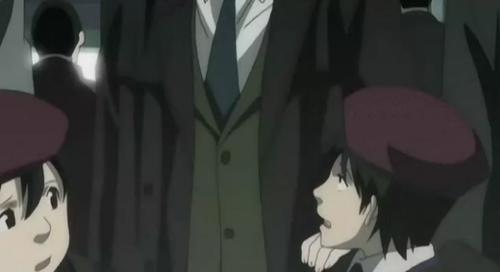
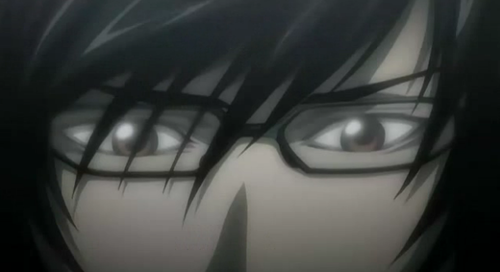
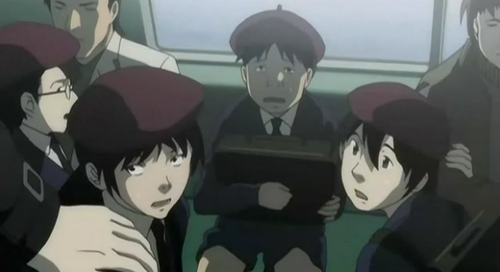
Finally having made up his mind, he goes over to the children and stops them. It’s interesting how he doesn’t say a word. He just puts his hand on the kid’s shoulder and looks at them with sad, disappointed eyes. And it’s enough - judging by the children looking back, they understand. (Ironically, the protected one is the one looking most scared of Mikami - he likely didn’t expect this.)
This scene correlates with Mikami’s memories of elementary school, a time where justice could win and he brought people to his side. It shows that even now as an adult, Mikami does think that children are still capable of change and that it is worth it to guide them to the right path.
The flashback continues when he’s in his office, looking through books. This time he thinks back to middle school.
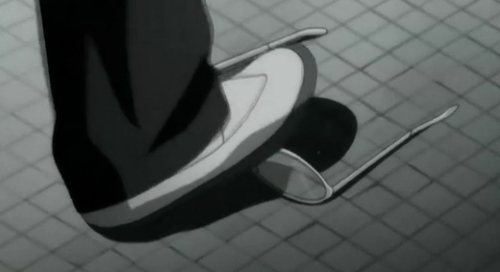
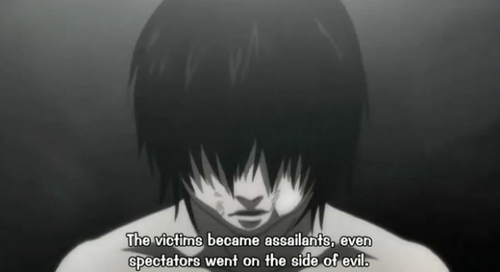
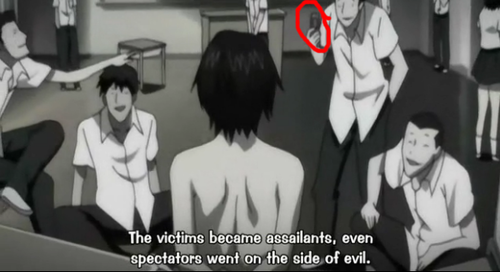
The anime depicts his bullying more graphically than the manga does. His broken glasses make a re-appearance but this time they are shown to be deliberately crushed beneath a boy’s feet.
The manga only mentions him being stripped naked for other people’s amusement, the anime shows him beaten up, naked, being photographed or filmed by someone - so likely pictures of this event were shared around the school. His hands are tied behind his back. In the background: people turning away, talking among each other as if nothing was happening.
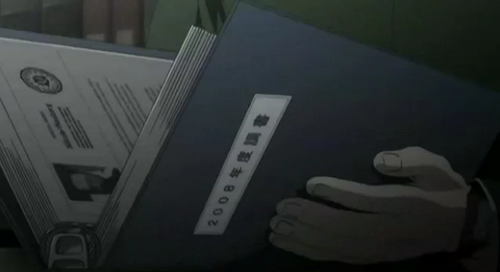
This is directly followed by a shot of adult Mikami closing a book in the present. A beautiful directing decision, I’d say, showing how he wants to end that chapter and not let it affect him anymore - he’s failing, but still.
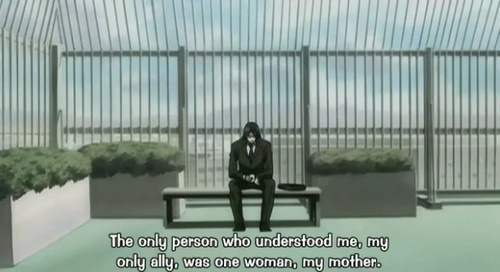
Then we jump to flashbacks of his mother, that he has in his coffee break. In the manga, his mother is described as the only person worried about him from an outside perspective - here, Mikami himself states her to have been his only ally. Then he corrects himself. 'No. It used to be my mother’. Past tense.
In this sequence we see him sitting on a bench, slightly hunched over, a coffee in hand. People walk past him without approaching. Lunch break would be a time for friendly conversation with colleagues, but Mikami spends it alone, reminiscing.
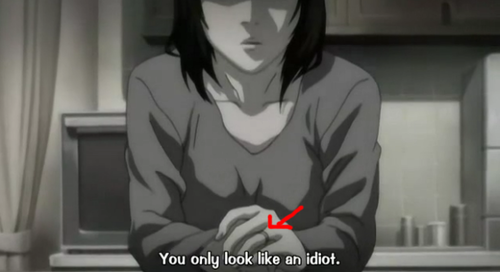
The flashback to his mother is largely the same as well, except for one added detail. Credit for noticing this certainly doesn’t go to me, I found it on the wiki page for his mother.
His mother wears a wedding ring. She’s stated to be a single parent, so for her to still wear a ring probably means her husband is deceased rather than her being divorced. Teru likely has been half-orphan since at least elementary school. This is the only hint towards his father that is ever given.
Back in his lunch break, we get a shot of Mikami’s wrist watch ticking, then he stands up mechanically. Considering his love of schedules he likely is very exact with how long he takes for his coffee break outside, following the same routine each day.
Past his work day we see him going to the gym.
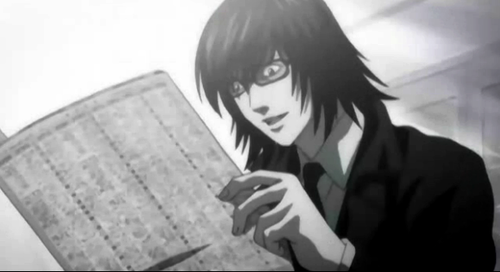
Here he flashbacks about God’s descend. I am not showing you this screenshot for any particular reason other than that seeing Mikami smile is really like hearing angels sing to me. Memorize this. It doesn’t happen often.
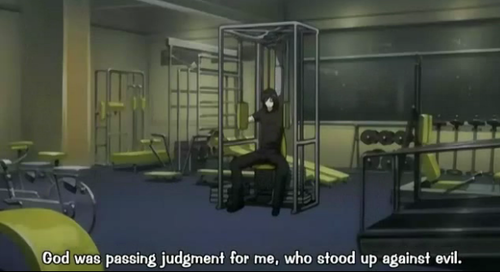
Mikami is then shown in the gym, working out. As someone without any other sport-y hobbies who works in an office, keeping fit by visiting them gym is apparently vital to him.
My further speculation is that he also does not want to be weak in case he needs to defend someone from assault - he has been physically overpowered by people all his childhood and I do not think he wishes for a repeat. This is supported by the fact that all training he’s shown doing is muscle training.
Interesting in the sequence following, his flashback to receiving the Death Note is that he never says he was also allowed to become a God like he does in the manga. He only states God shared his power with him.
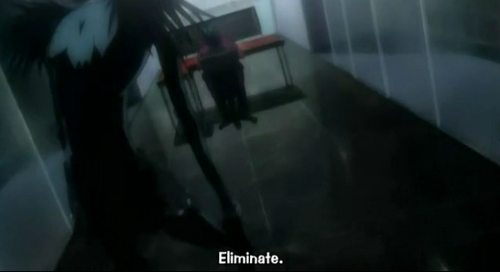
Look at that, we’re back in mystery desk hallway - this time with a chair and normal writing as he sits. Why was the former eccentric writing sequence necessary if anime Mikami is also capable of writing normally? We just don’t know.
Now that we caught up with the manga again, let’s go back to it as the plot advances.
It advances to something that the anime in its shortening of the second arc leaves out entirely. Mikami directly contacting Kira.
Mikami is not a passive follower - Mikami very actively pursues change. After Demegawa has become useless and was killed, Kira doesn’t send word on appointing a new spokesperson. Mikami knows a new voice on TV is necessary though, so he directly reaches out to Light to 'discuss’ a further plan. In public. On TV.
Since Mikami has spoken on pro-Kira TV before, he doesn’t consider it a dramatic break of character to do so again.
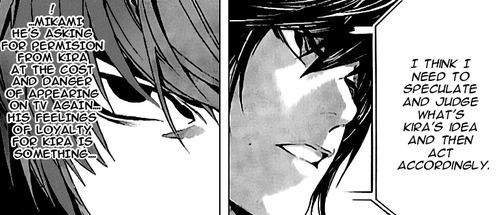
So he goes on TV and says that following Kira’s word is the best plan but if Kira’s word doesn’t come, he feels that he needs to improvise in a way he thinks is most according to Kira.
Now, of course he thinks that his and Kira’s opinions will be basically the same anyway. 'Live like you assume Kira would want you to’ has been his life motto before he knew Kira was a thing.
Even before he knows whether or not Kira will respond, he’s already thinking Kiyomi Takada to be a fitting spokewoman. Before we get to him and her, look at this picture of Mikami being entirely unamused between enthusiastic Kira fans.
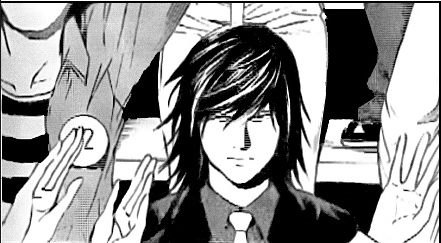
Alright, back to him and Takada. They met on one of the TV shows Mikami spoke in and she afterwards approached him because she agreed with his hatred of crime. Since they had similar opinions on this, they met privately as well. She is the only private social contact of Mikami’s that is ever mentioned.
(In the moment she approaches him, Mikami is shown in the same coffee-holding hunched position he spends his lunch break in. It’s during the filming break on the TV show, so he likely just spends all breaks ever this way.)
There has been a lot of speculation on the nature of their relationship in the fandom. Some insist their meetings to have been solely to talk about recent events while others think they were dates. I personally don’t think they were explicit dates, although Takada with her liking for intelligent prestigious men might have considered him an option.
Either way, they loosely are friends. For Mikami to be able to talk privately to someone repeatedly without growing uncomfortable with their thought process is quite amazing at least.
Still…
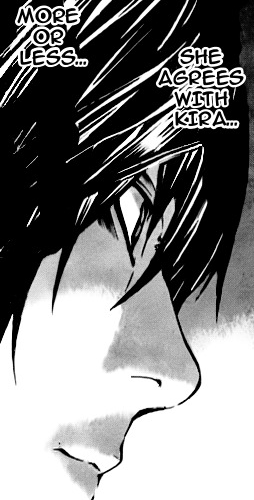
…even so, ultimate acceptance is far away. He doesn’t think Takada entirely thinks like Kira. That’s no surprise though, considering Mikami is very strict with his moral guideline. Even if he spoke to Light directly, he’d probably think he only more or less thinks like Kira - Mikami is still his own highest guidance, unknowingly. Being perfect in Mikami’s eyes is pretty unattainable.
Of course, he also doesn’t trust Takada enough to reveal his new Kira identity to her. Instead, he chooses her anonymously.
So, now that Takada’s been elected, let’s see how the anime is doing.
Primarily, skipping all of that 'Mikami reaches out for Kira’ stuff and going straight to Takada’s election.
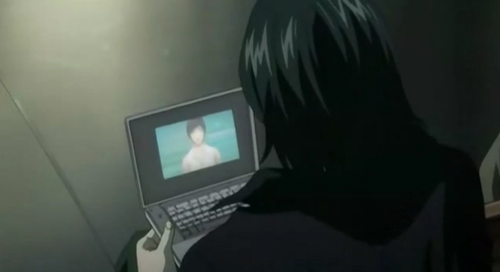
Mikami watches her first official TV appearance on his laptop on a train station.
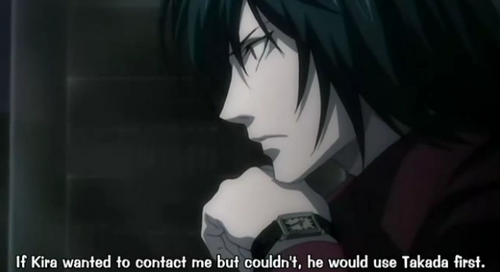
He is then seen to watch Takada’s show at home. I haven’t found a place to say this earlier, but please pay attention to his clothes. When he works he dresses in a green-ish suit, but at home he always wears a purple dress-shirt. He separates work and private life by colors. Further, his black hair is often depicted green-ish, while the anime-typical color-coded sequences have it change to purple. Outside appearance versus real, internal personality.
For fun, to see what the anime makers might have been thinking when assigning purple to him, I just googled the meaning of the color and this was the first phrase to come up: “ Purple is the color of good judgment.” Well then, this is clear.
According to this website (http://www.empower-yourself-with-color-psychology.com/personality-color-purple.html) this is the deepest need of someone who’s favourite color is purple: “Your deepest need is for emotional security and to create order and perfection in all areas of your life, including your spiritual life. You also have a deep need to initiate and participate in humanitarian projects, helping others in need.”
Weeeell.
Color psychology in Death Note is something definitely worth being looked into in detail, but not now and not here.
The situation at hand continues with what Mikami lets Takada say: even those who did not commit any crimes other than not using their powers for the best of society will be punished by Kira in the future.
Here we see a dangerous aspect of Mikami’s personality: when he finds validation, he becomes more extreme and daring.
Before, he despised lazy people like that but knew he was powerless against them, only focusing on prosecuting criminals. Now, knowing God is on his side, he thinks it is time to go big or go home, to put it in colloquial language. Encouraged in his thoughts of mass executions, he goes further than even Light planned people should go. Mikami is so thrilled at the idea of a new and better world that he wants to take all the steps he thinks of as necessary at almost the same time.
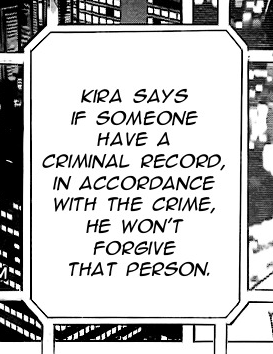
Meanwhile in the manga, Mikami lets Takada state his belief that people can not change. Contrary to Light Mikami is not only about judging recent crime and preventing new crime… he is stuck in the past and unable to move on. Mikami is a human being who is unable to forgive. After he came to believe that adults could no longer change back to being good people, he started judging everyone by all their past actions.
Once a criminal, always a criminal. Sins are never forgiven.
That’s Mikami’s way of thinking.
Meanwhile, Light has already contacted Takada and gotten her to use her program as a two-way-street in which both Kira tells his thoughts to the public as well as the public voicing their desires to Kira.
Mikami is observant and knows this is not something he ordered, so he immediately becomes suspicious when Takada acts different than expected. He does take her personality into account as well, thinking that this is something she would do, but considers it unlikely that this is all her decision now.
Now that he’s suspicious of her actions he wastes no time getting to the bottom of this and contacts her directly, proving his identity by killing someone from Sakura TV - poor guys, that seems to be about all they’re good for at this point.
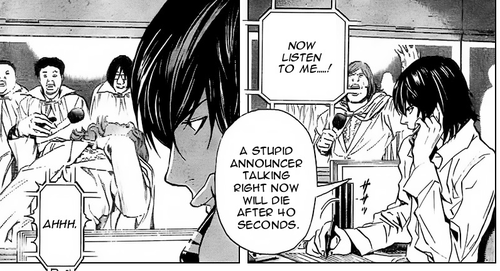
This is interesting because up until now we haven’t really seen Mikami speak impolitely. He’s always been a formal person. But here he is, casually throwing an insult at a person he’s about to kill. Mikami’s hatred for criminals runs deep and when it comes to them his normal correctness in speech can subside.
And then we witness Mikami’s quick judgement. Only shortly after finding Takada to have been influenced, he correctly guessed who was at fault for that.
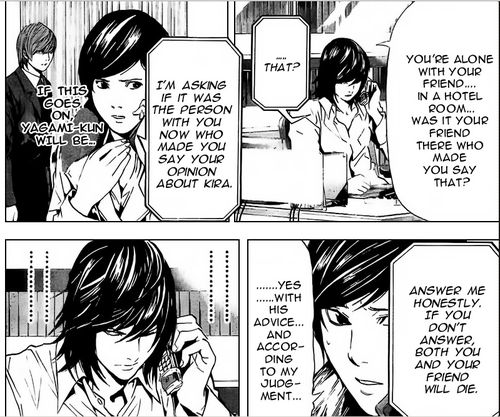
His way of interrogating Takada about her friend is rather ruthless in its authority - he is acting as Kira now and there is no talking-back when it comes to God.
And then he does a 180 in attitude when he gets to speak to Light.
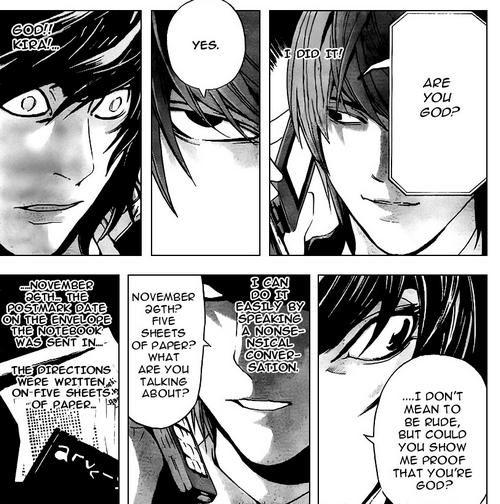
A moment ago he was acting as Kira and as such he demanded Takada to respect Kira through him as Kira’s substitute. Now he is nothing but the follower, respecting his God.
Once again we get to see how straight-forward and blunt Mikami is. Like when he went on TV to straight-out ask for directions, he doesn’t sugar-coat his relevant question here either. 'Are you God?’
Mikami has no time for little masking games, he wants to know the truth.
Despite the euphoria he must doubtlessly be feeling at the revelation (also shown by his impulsive reaction to get up from his chair), Mikami’s thinking still works fast. He knows Light can’t speak freely so he asks the key question himself, the thing he’s been wondering ever since receiving the note: 'Are you in a position where you can’t act freely?’
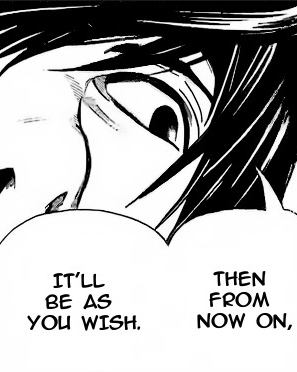
Light confirms that he’s being watched and Mikami assures him that he’ll do everything to make sure things go as Light wants them to go.
Keep in mind that this is Mikami’s very first interaction with Light as a person - what he’s been worshipping before was a concept that existed in his mind since long ago. This is the first time he and the human Light Yagami really get to be in contact.
And this far, he’s what Mikami wanted him to be.
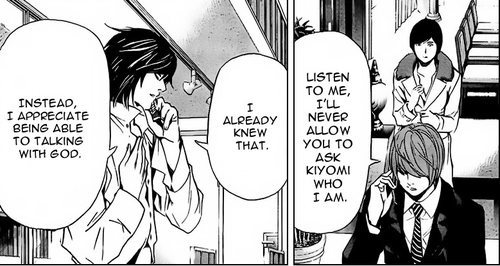
I spent a lot of time detailing Mikami’s subconscious and partly conscious arrogance in regards to God, but this time he’s modest. Just being able to speak to Light without knowing any details is enough for him, a religious experience already. Even though Light can’t see him, Mikami has his hand on his chest in a sign of respect.
To him, not knowing about God is a natural state. After all, even though he now knows him to be technically human, Kira is still largely a concept to him.
In the anime, Mikami only asks 'who are you’ not 'are you my God’ - he’s more subtle in this version. Another change is that instead of Mikami looking ahead and proving his identity as Kira right away, it is assumed that Takada already knows his number as that of Kira and needs no more proof. The one asking for proof is Light, resulting in the same murder of a Sakura TV announcer.
In the manga, Light also tells Mikami how they will communicate in the future - in the anime he just hangs up on him after they made contact. For all the time the anime was willing to spare for introducing Mikami’s character and backstory, they sped up all the plot parts considerably.
The plot goes on, largely without Mikami, until Light switches the executor from Mikami to Takada.
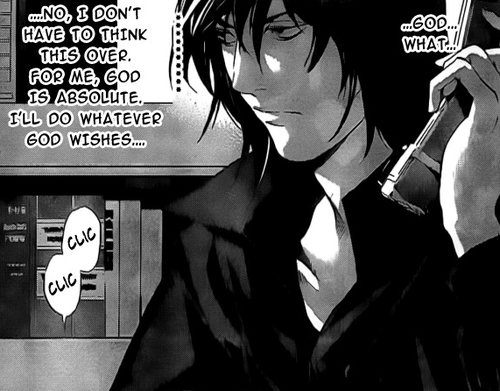
Mikami is confused by the news but ultimately decides he shall not question God. This is a grave difference from all the acting on his own he has done before he and Light could contact each other. Now his loyalty is fixed on a real person who he can really contact, so he finally becomes the obedient follower people remember him being. Now, Light has full control and Mikami obeys, actively suppressing his own doubts.
For a while, at least.
Plot goes on further, no Mikami in sight, until Near figures out he could be X-Kira by his previous TV appearances.
I’ll leave you with his contribution to Takada’s talk show about youth rebuilding the country, because I do not think it needs any real clarification:
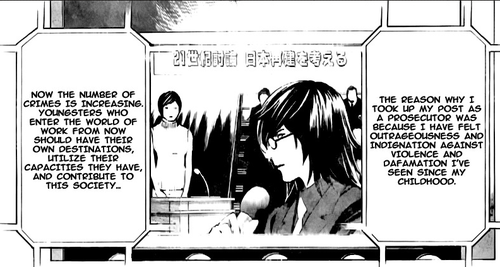
Moving on, Near now has Mikami being observed by Gevanni and that is pretty helpful for Mikami characterization because we get a thorough look at Mikami’s habits.
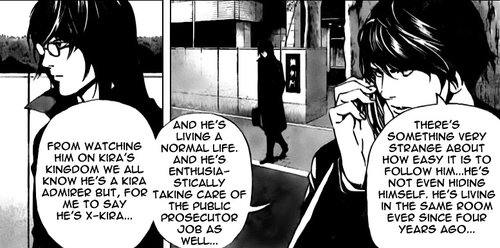
Gevanni is disturbed by how easy it is to follow Mikami because his life is more boring than the average life. He just openly walks to work and back and that’s about it. Normal people would have unplanned events and do more than that and occasionally disappear somehow - but Mikami? Nah. He’s like a clockwork, doing his thing.
So to convince people he is really X-Kira, according to Light’s plan, he needs to do something out of the ordinary.
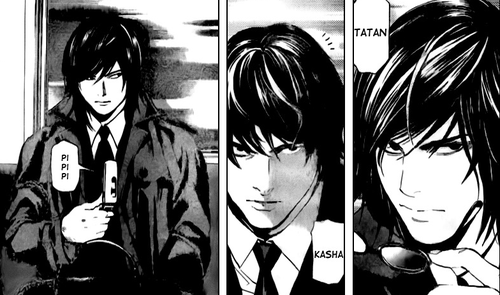
Showing these panels for no reason other than that they are pretty, sorry.
So anyway, he gets the sexual assaulter they witness on the train killed, convincing Gevanni that he is X-Kira.
Again, he is uncaring of the trauma he may cause to the victim by killing her assaulter in front of her. From the time in his childhood were victims are people meant something to him, he has changed gravely. He used to fight for justice to save people. Now it is a concept he is interested in and he doesn’t seem to really consider the victims as individuals anymore.
(Also he’s so used to death by now that he might just be desensitized and forgets other people aren’t?)
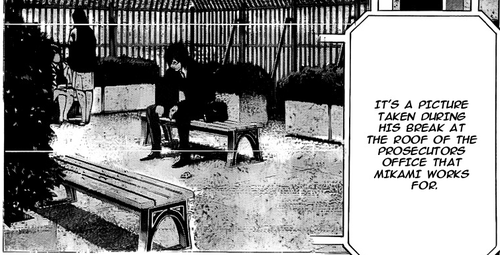
Further, Mikami convinces them that he has no shinigami by talking to himself in break. (This also proves he does spend all his breaks the same way - almost. He doesn’t have coffee here.)
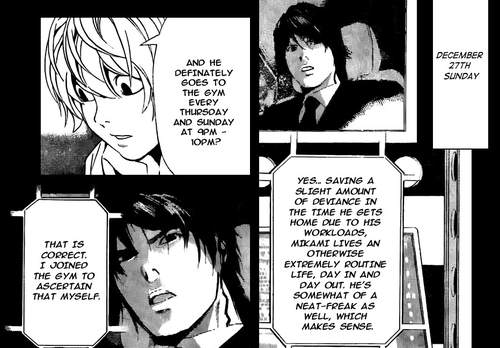
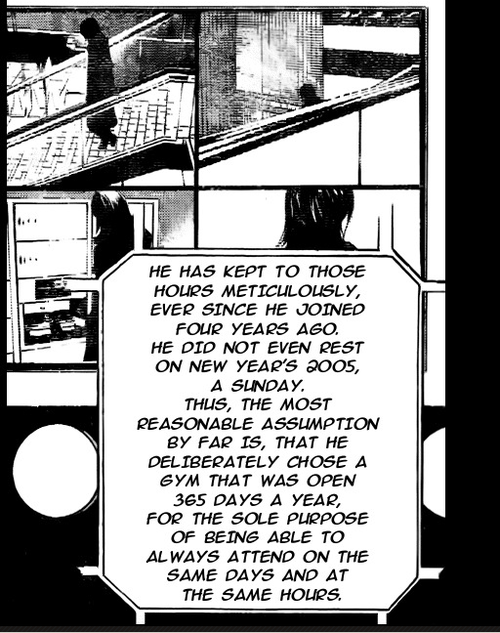
I can’t believe I got nearly 9k words into this post without getting to in-depthly talk about schedules. We’ve already been over how order as a concept of life is really important for Mikami to be able to function - here we see how it translates into his everyday life.
This goes further than being a normal orderly person. If you’re normal in living a structured life, distractions still happen. You need to make room to meet a friend or two, things come up, holidays happen… For Mikami, this isn’t the case.
While he does meet up with Takada occasionally or appears on TV, he otherwise keeps schedule obsessively. Holidays mean nothing to him. He doesn’t have any family he’s obligated to visit and he doesn’t have any reason to celebrate on his own.
Unsurprisingly he’s also a clean freak. He externally tries to live what he wishes for internally. He wants a world devoid of the dirt that is crime, so he keeps everything around him clean. He wants to believe in a world that is in order and makes sense, so he brings order into every possible aspect of his life. He also washes off the dirt that the bullies brought onto him. Whenever he got beaten up he got dirty, so that likely is another part in why he prefers everything to be clean.
Mikami is described as a very stoic character and in a way he certainly is, but he is also a man who relies on influencing external situations so he can maintain internal stability.
I’m not a psychologist but I’m pretty sure that if he got evaluated, Mikami would end up diagnosed with something, with his trust issues and order obsession.
On a slightly more fun note: it takes Mikami an hour to get home from gym, considering Near says he and Gevanni left at 11 and got home at 12. Quite the long way he’s willing to go for a gym that is open every day of the year.
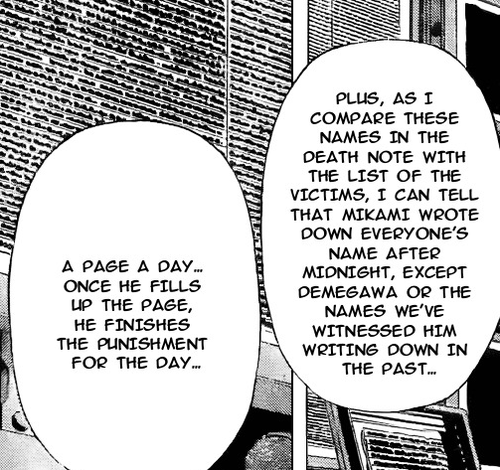
As Near evaluates the Death Note, we get to yet another example of Mikami’s order obsession. Mikami writes exactly one page of names each night at the exact same time, past midnight. (Since it takes him around an hour and he gets up at 6, this means Mikami sleeps 5 hours on average.)
Now we’re doing a giant jump because the next thing really relevant with Mikami happens when Takada is kidnapped.
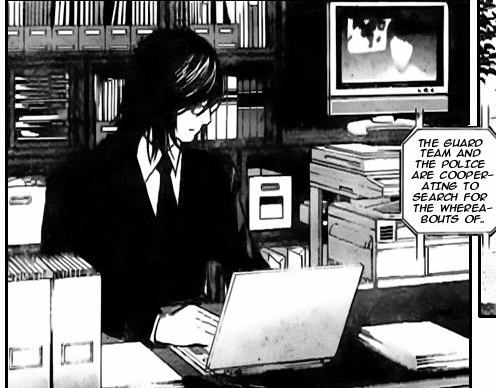
He’s keeping track of the situation from his office. He’s doing it because she is part of the Kira network and therefore valuable. If there are feelings on her personally involved, given she is his friend, is unknown.
So Takada contacts him with Light’s orders and as we all know, here’s where things start going down the drain for Team Kira.
I said before that for a limited amount of time Mikami is fine not thinking on his own but just acting as he is told - this is where that ends.
In the end, Mikami is unable to sit still and solely rely on someone else. Believing what he’s doing is the best possible choice, he acts on his own once again. (After all he thinks Light is unable to do anything.)
At this point Kira matters are his highest priority and make it easier for him to act out of schedule - which is suspicious behaviour and causes his downfall.
As we know, at this point in time he has faked the Death Note and is not using the real one - instead he keeps it in a safe. Now he accesses this safe to be able to kill Takada.
Light and Mikami have been paralleled before, but this quite clearly drives the point home that they think similarly. They both attempt to kill Takada in the exact same way with only a one minute difference. They both know that should she fall into the hands of the enemy, their plan is at risk.
Mikami, thinking Light cannot move freely, can no longer blindly have faith and takes matters into his own hands.
This is critical to think about. People always portray Mikami as the kind of person who just relies on God for everything, but that’s simply untrue. He constantly does small additions of his own to Light’s plans because he’s someone who always thinks for himself and acts based on what he deems right and most useful. Blindly following isn’t even his nature. He just pretends it is because it makes things easier for himself.
And aside from that, let’s spare a thought for just who it is he’s trying to kill here - Takada, his only known friendly social contact.
This is the effect having power has on him. Just like his views just become even more extreme when he gets validated, he loses sight of everything other than the grande scheme when he’s in power. Given the power to attain his ideal world Mikami forgets about humanity as such.
Takada isn’t a person to him anymore, she’s a part of the scheme. For the ideal world sacrifices need to be made. It’s important to think that Mikami doesn’t really think Takada is unrighteous. Before, he only killed people who he thought of as deserving of death. Takada isn’t. Takada only has to die so Kira can succeed. And she’s not even a nobody, she’s someone he knows and used to appreciate.
Confronted with the power to make them reality, gradually Mikami lets go of those very ideals he has.
As a child Mikami believed in a better world for the people but his character development from then on is just a downwards spiral to a person who has nearly forgotten why he ever started wishing for the things he wishes for.
Inside of him used to be a longing for peace and smiles, like a small flower. Around it he built armor to give this fragile part of him stability. The flower wilts and the armor remains, cold and unmoving.
Excuse my cliched metaphors, but that is the easiest way I know to explain this phenomenon.
Okay, now that we’ve done a lot of manga, let’s check up on how the anime was doing in the meantime.
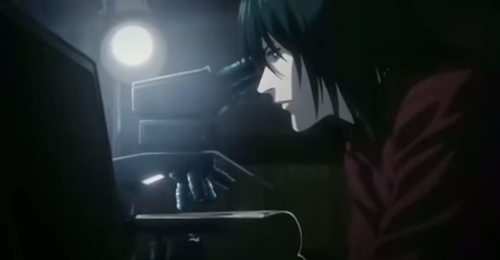
The anime actually shows us Mikami searching the (already fake) Death Note for the minor changes of being faked, using a microscope to get it down right to the details. Why did he already own a microscope? I wish I knew.
But at least he can figure out that the Death Note has been exchanged, somehow. Since he created the replica that the SPK now replicates once again, he knows the details of its looks.
Here’s what Light has to say about Mikami replicating the note and discovering it has been faked again:

Even put this way, it’s pretty amazing to think Mikami can just easily copy something in this much detail. To the characters in DN such things don’t seem to be a big deal, but that is not really a normal people skill.
To be fair, Near hadn’t made contact with the real note before. So in that sense, Mikami had more liberty in the recreation of it than Gevanni. If details were false, the SPK couldn’t notice because they had nothing to compare against. While faking the cover might have taken some skill, most of what Mikami needed to do was write all the names he’d written again.
It’s more amazing to think that he’d memorized the note in enough detail to realize when Gevanni exchanged it.
Aside from that, the anime doesn’t add any scenes until the finale comes around. Here’s where manga and anime Mikami will start to differ drastically. As always, let’s start with the manga.
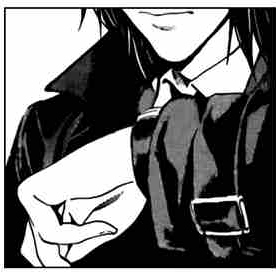
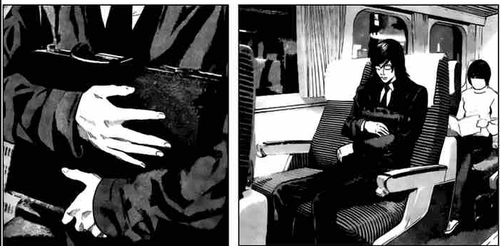
One the way to the warehouse, we get to see small examples of Mikami being nervous. Checking his watch is just a normal movement, seeing he does like time planning very much, but the way he holds on to the suitcase with the Death Note in looks incredibly tense and to point that out is shown in close-up. He’s had the fake Death Note with him all the time, but now that it’s the real one he’s scared to let go of the suitcase for even so much as putting it down beside him. Instead, he clings to it, almost as if for support.
At his arrival at the warehouse, the art style he is drawn in suddenly changes. Obata now portrays him more as the fanatic madman they shaped him out to be. This has been cause of a lot of the most ridiculous fandom discussions about him that read 'omg he used to be hot but now not anymore, what a shame’ and to that I can only say: who looks hot in severely mentally straining situation? Finale Mikami goes from the most extreme manic euphoria he could be capable of feeling to the lowest he’s ever been (which is saying something). Of course that’s not hot. What was anybody even expecting.
So anyway, Mikami goes to assassinate everyone except his God.
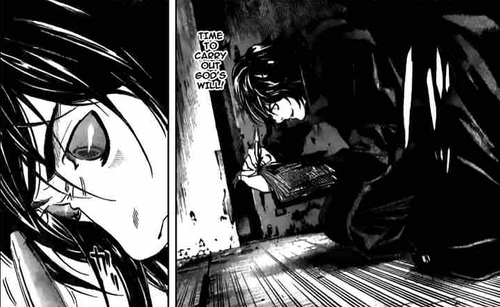
He does it while sitting on his knees on the floor, which is interesting for two reasons. A) It resembles a prayer position to fit in with the overall religious allegories DN goes with as well as Mikami’s personal approach to Kira. B) He’s sitting on the dirty dirty floor. Now, him being a clean freak is something only once mentioned so I might be exaggerating this, but I do think it’s amazing that he drops down on the floor outside a dirty old warehouse so easily. His fanatic view of Kira let’s him forget and step over his usual boundaries in every way shape and form.
So then, for a while Light monologues on his brilliant plan.
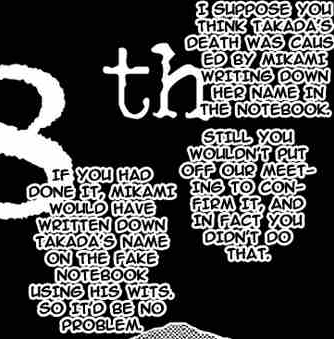
How much confidence he has that Mikami would have written Takada’s name in the fake note as camouflage for him automatically is kind of cute. He does rely on Mikami to think for himself, but he didn’t expect the extend to which he’d take matters into his own hands.
Anyway, from the point at which Mikami has finished writing names on, he is drawn and written as the caricature of an 'insane person’, which I would argue is kind of offensive and insensitive, but oh well.
Now, with Kira’s goal in reach and God in plain sight, Mikami loses all composure that has kept him together over the past years.
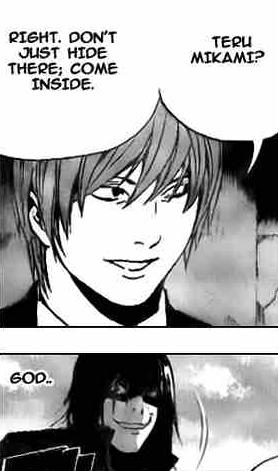
In a way, this 'insane’ portrayal seems weirdly infantilized in behaviour. The rational thinking subsides and what’s left is just the intuitive feelings of worship he has for Light. (If you wanted to take this to a further level, consider this: Mikami started to truly believe in a punishing God as a coping mechanism for the death of his mother. You could, if you wanted to interpret this to a bizarre degree, argue he’s looking for some sort of heavenly mother in Kira, relating back to this nicely. I wouldn’t do that though. That’s a little weird.)
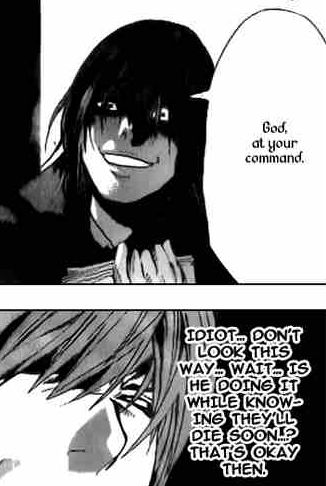
He’s also losing all caution, because he’s sure, absolutely certain, that they are going to win. That’s how it has to be. God cannot be defeated.
Also let’s point out again, just for good measure, that a great deal of what he sees in Light isn’t actually Light. Mikami doesn’t really worship Light Yagami. He projects his undefined worship for his own childhood thoughts on him and that makes a grave difference.
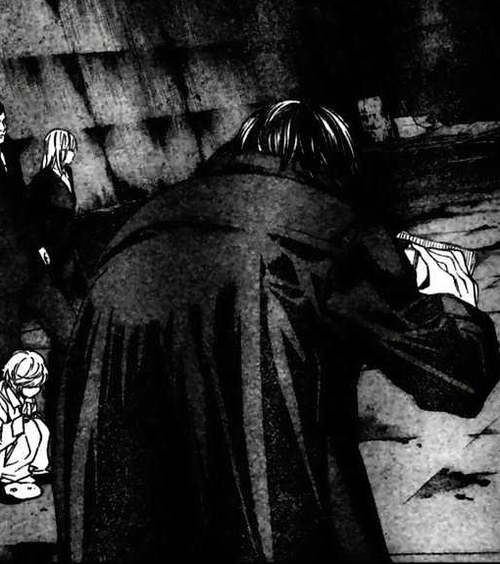
What’s also notable about the way Mikami is portrayed in these scenes is the way he stands. We’ve seen him hunched over in his breaks, but when he stands and walks he’s usually having his back straight. An upright person.
Here, this changes and he completely hunches over even when standing. I suppose this is again a way to artistically say 'lol insane’, but it’s also interesting considering Mikami so far has tried to put all his inner feelings outward. An upright citizen walks upright. Now this tension seems to drop as he falls apart.
It’s fascinating that he already falls apart before their plan fails - all of him has been build to survive in a world that was the opposite of how he wanted it. Now that a perfect world seems within reach, he feels an amount of joy and excitement that is entirely uncharacteristic and that he doesn’t know how to deal with. Mikami doesn’t start to break at failure, like Light does, Mikami starts to break at success.
But things really go downhill when he finds nobody is dying.
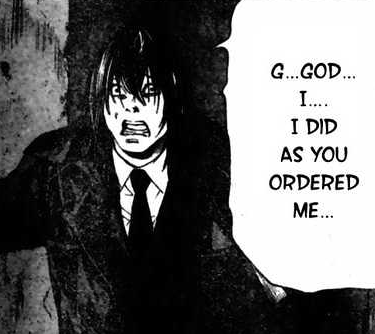
Yes, he did and then he did a lot more - is that even considered obeying anymore? But of course, for Mikami it is easier to just put the blame on somebody else. Kira is his scapegoat. All convictions and actions are his own, but instead of taking responsibility for himself Mikami always chooses to see himself as merely a follower.
Mikami needs a God so he never has to face the consequences of his own thinking. Mikami needs a God so he can hide from himself.
While Light correctly assesses that Mikami would rather die than betray his God, he still lacks the knowledge to understand him properly.
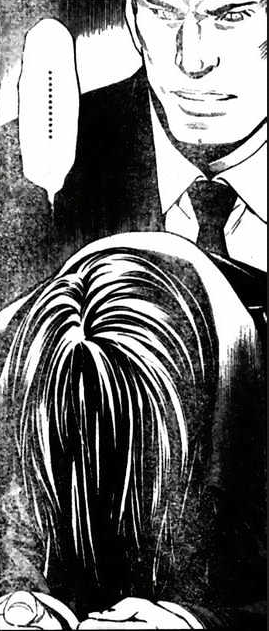
And then this God, who Mikami used for his own peace of mind, betrays him - insists he doesn’t even know him. Mikami is devastated. It puts cracks into his flawless image of Light to hear him lie, about this especially.
But this far, his belief is not yet broken. He’s mostly confused and terrified of this unexpected turn of events. 'Not as planned’. To Mikami, who heavily relies on order and planning ahead, the meaning of this is just as grave as it is to Light.
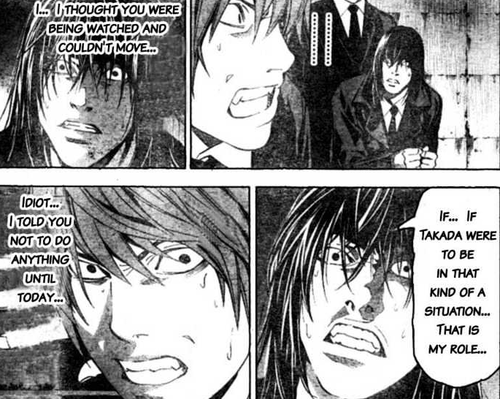
This is why communication is crucial in any relationship, boys.
So, Light and Mikami finally figure out what went wrong and that’s that both of them thought the same thing was their duty. Light failed to tell Mikami he had a backup for situations like that, so Mikami naturally assumed it was up to him to handle it. That is only reasonable - if anything, blind faith is a stupid thing to have. But that’s just what Light had expected of Mikami (just what the entire fandom still thinks Mikami has).
Cue flashbacks to Mikami accessing his safe with the real Note so he could kill Takada.
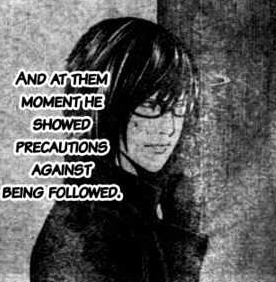
Mikami at this point shows fear of being followed for the first time. Before, being followed was part of the plan - and really, aside from the Death Note he had nothing much to hide. There is no 'omg I need to act normal’ for Mikami because 'normal’ for him is a parameter that can be measured in numbers. Mikami just needed to follow schedule to seem normal.
Now that he acts out of schedule he looks like an amateur in a crime movie, scared, looking around again and again. He’s not made for this whole dishonest, sneaky thing.
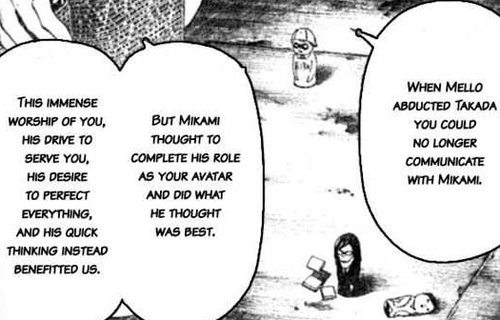
Near sounds more positive about Mikami’s attempt to act for Light than Light ever does. Well, considering who he ended up helping to win, it’s no surprise.
So now, Light holds an endless speech detailing how he and only he is the one who could have done all this, how Kira is needed and all that.
Mikami is never really shown so he presumably just stands there, dazed, listening - and discovering what kind of man it was that he placed his belief in.
And then Light calls out to him.
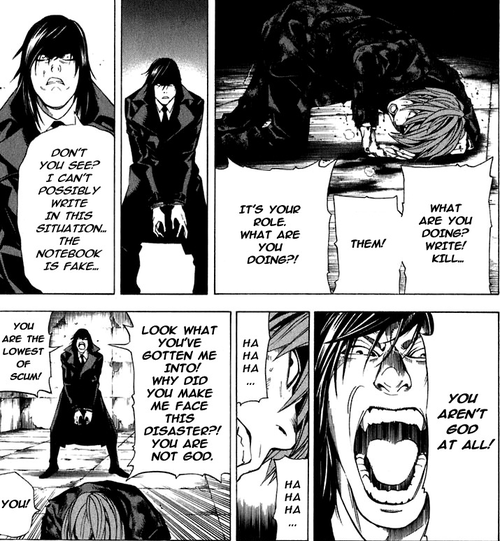
Ah yes, the page where Mikami suddenly looks like a One Piece character while yelling.
Also one of the most crucial Mikami moments.
A lot of people seem to think his worship of Kira is somehow unconditional and I’ve already detailed a lot of ways it’s not, but this just shows how fragile it is.
He’s seen Light, the person Light Yagami, break down and he hated what he saw. Light is not in any way what he imagined him to be. Even though Light’s speech detailed a lot of the ideals they share, Mikami finds himself nothing but disgusted with Light.
He worships Light as long as Light is what he expects him to be, the saviour he wished for since childhood. Once Light stops filling that spot, whatever they had is irreversibly broken.
He says what we’ve all thought about Light Yagami at some point: 'you’re trash’.
But also, despite the very healthy realization that Light is not God, Mikami doesn’t really do anything else here that is good.
Once again, he refuses to shoulder any responsibility. He blames Light for being tied up. He blames Light for everything that went wrong. He completely disregards that at no point in time he wanted to quit being X-Kira; that all of this is as well his fault. He even goes as far as to asking Light why he has to see this scene, why he ever brought him into this situation.
As if him being in this situation had nothing to do with him, you know, willingly participating in mass murder.
A question that easily arises is 'What would have happened if Teru was the one to find the Death Note? Would he have done the same things Light did?’
Well, I think he would certainly have become Kira, but he’d not have tried to become the highest God. Instead he would still have pretended to only work for his God. (And Ryuk would be like 'lol no’ and Mikami would be like 'just you see’ and Ryuk would be like 'suit yourself’.
Because for Mikami to acknowledge there is no God, would be to acknowledge that all his life he’s been alone and unprotected, without anybody at his side. I don’t think he could do that, not even to become a God himself. He doesn’t want to be the one to bring order. He doesn’t want order to be a human creation.
All he wants is a god-given structure he can follow, a structure above human judgement that he can use to measure if he’s done 'good’. If he was the one creating the order, he’d have to admit that before him there was chaos. I don’t think he’d ever do that.
Back in the manga, he then is forced to watch Light die.
In the epilogue, he’s only mentioned indirectly.
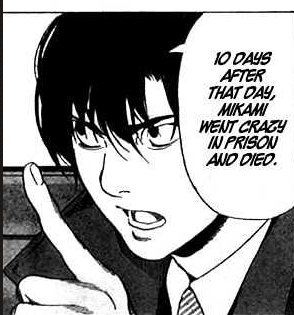
Well, shit. But unsurprising. This translation somehow manages to omit the fact that it was very much a suicide, something every other translation I’ve seen always pointed out. EDIT: It has been brought to my attention that this is indeed a completely correct translation and that the clear statement of it being a suicide is never made in canon, but a general fanon assumption.
For the rest of this, we are oing to assume it was a suicide, but we need to keep the option in mind that it might not have been. Acting in a way perceived as 'crazy’ and then dying of an unspecified cause might very well indicate the use of the Death Note.
Now, Matsuda has a theory about that death.
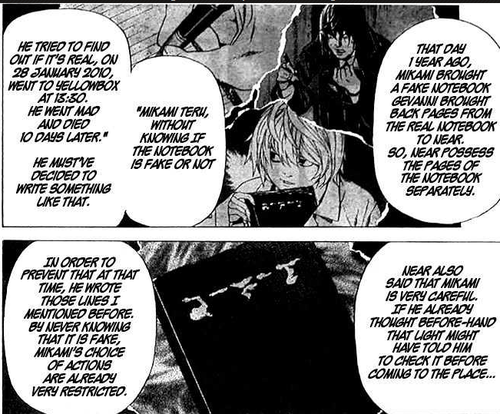
It’s never confirmed one way or another whether or not Near is the one who killed Mikami.
I’m not in the position to discuss the Near end of this, whether or not he would have done it. All this analysis is about are the implications for Mikami.
First, it makes a ton of sense for Mikami to commit suicide upon finding himself in prison. Unrighteous people end in prison. The world doesn’t need unrighteous people.
Mikami might be someone who clings to life and sanity desperately without even knowing, but he is also still very much a fanatic with rigid principles. There are no exceptions to his good/bad view. If he himself ever fell unrighteous, he would not hesitate to do the 'morally correct’ thing to him and take his own life.
Having caused Kira’s failure would only strengthen this effect. However, if the Note was already burned at that time, Mikami wouldn’t remember anyway. He’d just know he’s somehow convicted as a killer - or, if Near felt like being honest, for being an accomplice to Kira. In the latter case, he’d also rather die than be in the hands of enemies to the Kira moral.
Now, if Near isn’t the one who killed Mikami, he died because his lifespan was up. A lifespan cut in half by the shinigami eyes. Mikami dies half a year after making the eye deal, so granted Near didn’t use the Note, he only had a year to live at the time of becoming X-Kira.
He always struck me at the type who’d wind up dying young, so it fits.
(This is assuming though that his lifespan has not been indirectly influenced by Death Note murders.)
Near or no Near, Mikami’s death is befitting of his character. The one thing that I can hold in favour of the 'Near killed him’ version though is that it took him 10 whole days in prison to commit suicide. Had I been left to guess before knowing the canon time, I’d have said he’d only have been able to stand it two or three days.
Now, speaking of his death though, the anime handles that completely differently, so let’s move on to our last station. The anime finale.
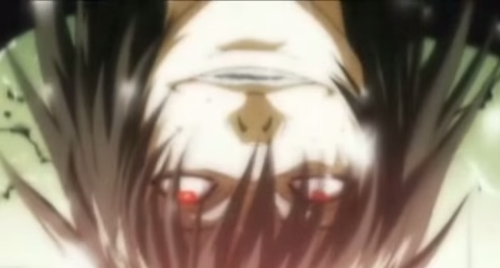
Needless to say, they took the scene of him attempting to kill everyone even further than the manga. Overdamatic is kind of the anime’s second name. I don’t have anything to say on this other than that he appears to say more 'Eliminate’ than he actually had names to write - it would make more sense to say it at the end of each name, but this is an exceptional situation anyway. (Also I didn’t count, but he says it so much that I think I’m right here, haha.)
The anime first sticks to the manga pretty well in regards to Mikami so all it adds is that we can audibly here his confusion and fear. They also add in a strangled scream when Light says he doesn’t know Mikami.
So then Light and Near both hold their impressive speeches while the rest of the cast mostly stands there. Matsuda kind of shoots Light… and here’s where we get to see Mikami again.
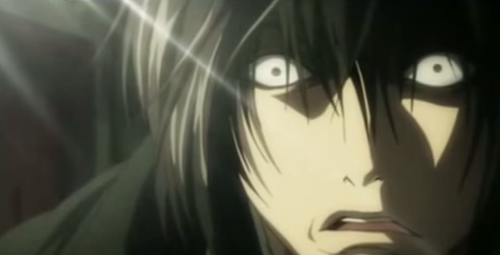
He watches Light’s breakdown in terror of seeing someone he thought he looked up to fall so low. Light calls to him for help.
Unlike in the manga, anime Mikami doesn’t shout at Light that he’s trash. He doesn’t blame Light as much either. This Mikami still seems to have a tiny bit of loyalty left, but he also can absolutely not live with having helped Light who he now can see is not God at all.
So Mikami makes a choice that benefits both of the struggling sides inside of him.
He commits suicide then and there, in the most spectacular way.
He can’t go on knowing he has a) worked for a Kira who he cannot accept as righteous and b) caused the downfall of the one who was the only chance he had to make his ideal world a reality. Mikami himself needs to be eliminated. He can’t live with himself any longer.
But he could have waited. He could have seen Light’s end through to the very end.
He doesn’t. He rams a pen in his aorta and pulls all attention in the room on him.
He gives Light a chance to escape.
For that, he is willing to die in a most painful way. It’s like he’s saying 'I can’t stand what I’ve done for you but if there’s any chance you can still make this world better, then take it.’
Mikami in the anime is still unsure on right and wrong with Light. For the first time, he’s unable to put someone in a category. With this first uncertainty he dies.
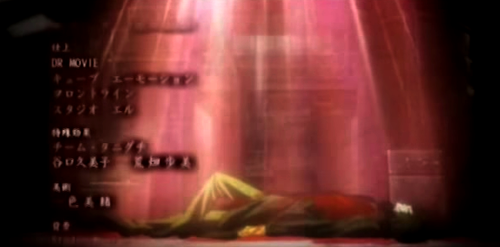
Mikami’s death in the anime is more gruesome and spectacular as well as more 'fix it’ in regards to his relation to Light - the anime in general seems to have had more sympathy with Light.
I like both versions and I like to think that both are plausible ways of action for Mikami and only small parameters decide which comes into play. If asked, I’d always prefer the manga version because it stays much more true to Mikami’s relation to Kira, but I can’t deny the anime makes me emotional.
Let’s conclude this long long journey with the special info provided to us by the 13th volume, How To Read.
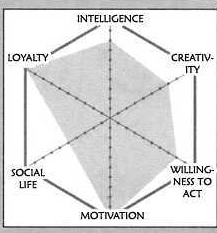
Loyalty 10/10? Oh well. At least for seeming loyalty that makes sense. I think we as a fandom can all agree that all of the special profiles seem weirdly bullshitted anyway. Nothing here is in any way surprising other than social life.
I am assuming that this is in reference to him being able to lead an all normal work-life. The German copy of How To Read that I own has this translated as 'Social Competence’, which I think is a lot more fitting.
However, it also translates what is 'Motivation’ here as 'Mental Strength’. In that case, I find the English a bit more fitting.
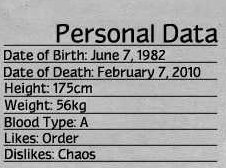
Like almost every DN character (except for Matt I believe), Mikami is underweight. With him, I think it even might make sense, considering that in the end he is a workaholic who tries to take care of himself but might not always succeed.
But… what’s that…

What’s amusing about this is that, despite the fact that these sections look like a huge uninformative disappointment, it’s actually all you need to know about Mikami. The entire guideline all his life and choices are based on. This sums him up. It’s literally this simple.

I’m sorry you just had to read 13k words to just get to this conclusion.
I hope it has been at least a bit informative and thought-provoking though. If there are questions or anything that you disagree with and would like to discuss, add those to the post or contact me privately.
Believe me, talking about Mikami is what I live for. However small the issue, I will jump at the chance to discuss.
Again, thanks for reading my unorganized rambling.
mixomatosa liked this
iwalains reblogged this from mikami
iwalains liked this
vodkacniv reblogged this from mikami
vodkacniv liked this
merivilia liked this
xg0r3wh0rex liked this
plufferpalen liked this
raskolnikovbaby liked this
firefly--lights liked this
 atomicpsyche reblogged this from mikami
atomicpsyche reblogged this from mikami 3gglady liked this
imsorrywhatsalifeagain liked this
wintercicada liked this
kiradakaraa liked this
pocket-merlin liked this
 thisworldisrotten reblogged this from mikami
thisworldisrotten reblogged this from mikami  marblucifer liked this
marblucifer liked this  ono-onion liked this
ono-onion liked this bifurious16 liked this
 madeincyrene liked this
madeincyrene liked this crimeliet liked this
miniaturekittenkoala liked this
 et-5t4rdr490n liked this
et-5t4rdr490n liked this  stellaplanckia liked this
stellaplanckia liked this lightwood-alec liked this
anzuivt liked this
famousjae101 liked this
gyaruvestite liked this
 mikamif liked this
mikamif liked this  juststupidthings123 liked this
juststupidthings123 liked this kira-cat reblogged this from mikami
requiemofthespirit reblogged this from mikami
requiemofthespirit liked this
 eldiasgod liked this
eldiasgod liked this  cyberfairyofchaoticacademia reblogged this from mikami
cyberfairyofchaoticacademia reblogged this from mikami  cyberfairyofchaoticacademia liked this
cyberfairyofchaoticacademia liked this kind-wizard liked this
 cozycoldseasons liked this
cozycoldseasons liked this shanesfandomhub liked this
mikami posted this
- Show more notes


